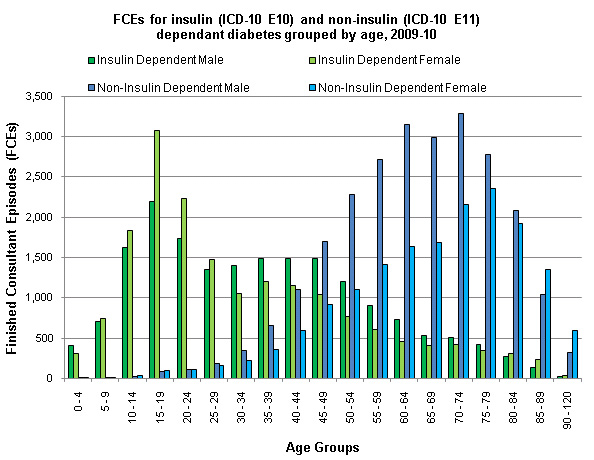IN THIS SITE...

- NHS Choices: Diabetes
- Diabetes UK
- Inpatient Data
- Self Service
HES on... Diabetes
What is Diabetes?
Diabetes mellitus, often simply referred to as diabetes-is a group of metabolic diseases in which a person has high blood sugar, either because the body does not produce enough insulin, or because cells do not respond to the insulin that is produced.
Who does it affect?
NHS Choices states that:
- Insulin dependent diabetes occurs when the body produces no insulin. It is often referred to as type 1 diabetes. It is also sometimes known as early-onset diabetes because it usually develops before the age of 40, often during the teenage years.
-
Non-insulin dependent diabetes (or Type 2 diabetes) is far more common than insulin dependent diabetes. Around 90% of all adults in the UK with diabetes have non-insulin dependent diabetes. This type of diabetes occurs when not enough insulin is produced by the body for it to function properly, or when the body's cells do not react to insulin. This is called insulin resistance.
Non-insulin dependent diabetes is often associated with obesity. Obesity-related diabetes is sometimes referred to as maturity-onset diabetes because it is more common in older people, a finding confirmed in the HES data below.
The graph below helps to illustrate that there are more hospital episodes for insulin dependent diabetes for those under 40 (63% - 22,856 of all insulin dependent diabetics treated in hospital), the opposite of non-insulin dependent diabetes for which more FCEs are for those aged 40 and over (94%, - 39,188 of all non-insulin dependent diabetics).
 |
HES facts and figures
HES data for insulin dependent diabetes (ICD-10 - E10) and non-insulin dependent diabetes (ICD-10 - E11) in 2009-10 shows:
- There were 78,124 finished consultant episodes.
- 66% (37,555) of hospital admissions are emergency admissions.
- 56% (43,591) of finished consultant episodes are male.
- Diabetes accounted for 292,650 FCE bed days.
- The average length of stay was 6.8 days.
More information on this topic is available from the following:
- NHS Choices
- Diabetes UK

